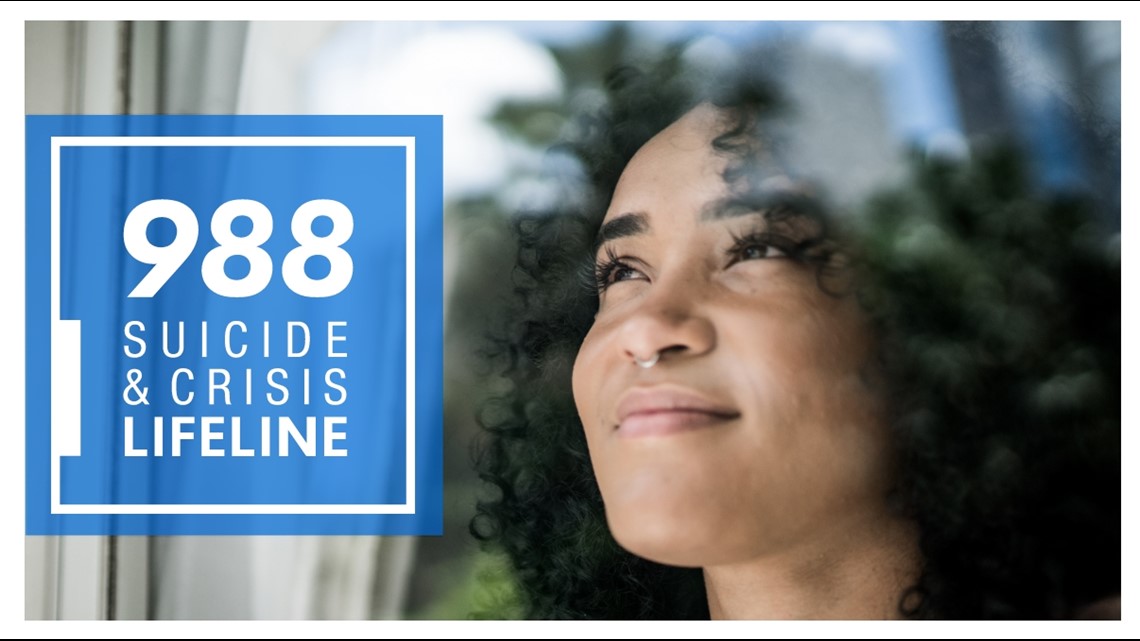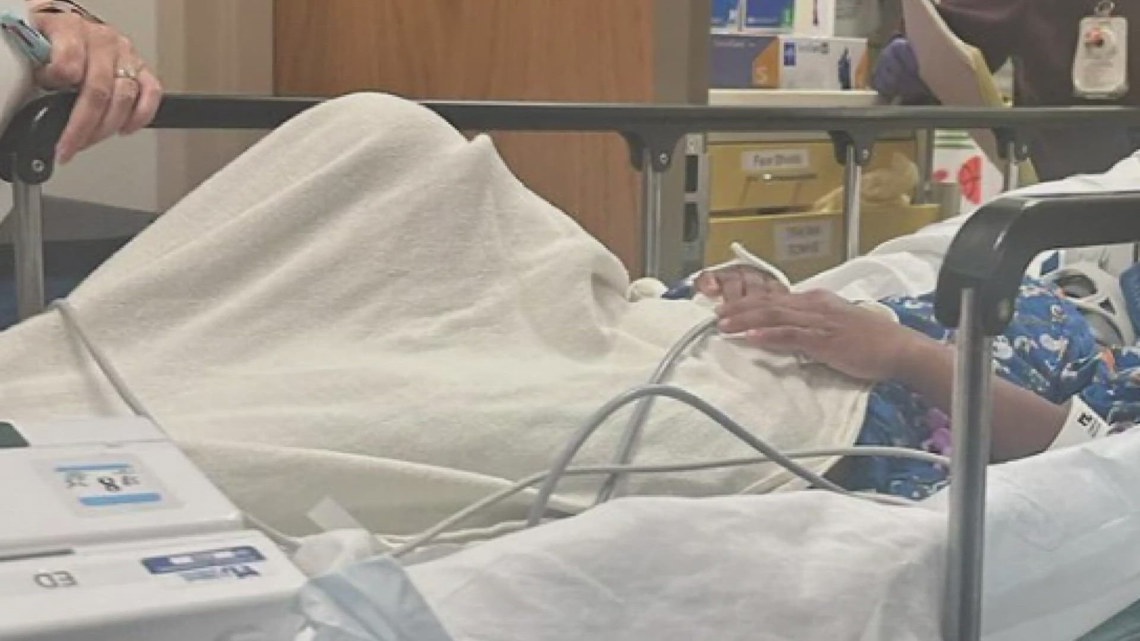Commemorating September as the suicide prevention month, here is how you can help people dealing with suicidal thoughts. Disponible en Español.
WASHINGTON — Editor's Note: This story deals with suicide and aims to inform readers in understanding the resources we all have when dealing with tough situations. A Spanish version of this text can be found below.
Suicide is a sad reality in our society. It touches almost every family and can affect us all. We have all heard of it and many have even lost some loved ones due to it.
In September, we reflect on ways to prevent suicide and raise awareness about it. Most importantly, this story intends to navigate various possibilities of how we can all help each other.
According to the CDC, suicide is one of the leading causes of death in the United States. In 2022, 49,449 people died by suicide, which means that one death occurred every 11 minutes on average.
When we think about the causes of suicide, experts say they vary, but in today's world, it seems they are all linked to feeling disconnected.
Dr. Brandon Kohrt, psychiatrist and professor at George Washington University, stated that people normally dwell between two risk factors: "not feeling like one belongs" and thinking one is a "burden in someone else's life."
The above considerations are necessary to help us understand what goes through the mind of someone who has thought about suicide. WUSA9 spoke with Pablo, someone who dealt with these two constant thoughts, and he allowed us to share some of his thoughts to explain what worked for him.
Pablo, at the beginning of our conversation, used a metaphor that encapsulated his experience; he said he "felt like a French soldier in the trenches of World War I." Pablo was dealing with romantic problems while navigating the waters of understanding who he really was. He often felt like he was "disgusted" with himself ─ which made him feel worse because he had a reasonable, decent life.
One key element Pablo highlighted in our Zoom call was that he felt his happiness was ripped away by this feeling, and as a result he felt his life had "no meaning." The disconnection with reality made Pablo feel like he had to resign himself to living in "airplane mode."
In such deep pain, Pablo said silence speaks the loudest, and people dealing with suicidal thoughts want to scream but can't really do it. So instead, his pain came in the form of lashing out ─ a way to let others know what was going on in his life.
This type of behavior made Pablo feel he was a "bad person" and that he had to punish himself for mistreating people. This mindset resulted in some self-harm practices that made him believe the only way to deal with all this pain was to end his life.
"Self-harm is a cry for help and attention," he said.
Thankfully, Pablo is still with us, and he expressed what truly saved him from going down that dark path was knowing that he had a handful of people who he felt he could trust ─ people who he knew would listen and not judge him.
Professor Kohrt said that this validation, the one Pablo felt with his friends, is necessary to letting people who are dealing with such disconnection know that they have someone to talk to ─ even if they don’t talk much, just knowing that you are there to listen could be everything they need. In reality, it is everything we all need.
In this regard, Professor Kohrt—a father himself—advises parents and caregivers to create the space and the time to talk about this topic with their kids. Korht explained it may take longer for teenagers to express how they feel, and even though you might not get an answer on your first attempt, their pressures will begin to alleviate just knowing you are there willing to listen to them. Professor Kohrt also said parents and caregivers need to learn to be comfortable with silence, and he suggested some activities to increase trust in their kids, like going for walks together, playing a sport that involves cooperation, and expressing to their kids they love them regularly.
"Our lives have become so scheduled. Every single moment is just booked up, and the teenage brain does not work like that," said Kohrt. "So, it is really just trying to create as many opportunities and not trying to assume that if there is not an initial sharing, then that means that that communication is not accessible. Keep trying, keep being available."


On the other side of the spectrum, if you are an adult going through a rough time, Professor Kohrt said that any type of physical activity is key to helping you de-stress. Also, choose a social activity that allows you to share time with other people.
"Loneliness is like a form of illness. The more time we spend alone, the more our body is not able to combat a whole set of physical and mental health conditions. So, it really is something that we all should be making an effort to seek out care if we are feeling lonely, and to help identify those whose lives are not socially engaged and create more opportunities for human connection" Kohrt said.
Based on studies, and to the best of his knowledge, Professor Kohrt affirmed that asking about suicide actually reduces the risks.
To highlight available resources for you to contact when experiencing suicidal thoughts, we spoke with Dr. Barbara Bazron, Director of the Department of the Behavioral Health in the District of Columbia, who pointed out a set of tools for your service.
The District offers 24/7 counsellors who can be reached by phone at any time of the day. You can call 988, and somebody will be ready to talk to you. Additionally, thinking of those who like texting more, you can also choose to do so and a counsellor will be ready to respond.
"One thing I like about this service is that it is anonymous. You don’t have to give your name or anything. Unless you want to, we do ask you for your phone number in case the call gets disconnected," stated Dr. Bazron. "Also, if you need more than just to talk on the phone, or to chat, or to text, we can, from that line, deploy our community response team your way."
There is a new geo-routing service available when you call or text 988. Depending on your area code, you will be redirected to the crisis line of your state.
"If you are in crisis, and you need us to deploy a crisis team, we need to know where you are," Dr. Bazron said.
This service, though, is only available for T-Mobile and Verizon users as of now.
We are aware that calling this line could feel overwhelming, so we suggest that if you have a friend, a family member, or a loved one experiencing suicidal thoughts, you call together and be present while they express how they feel with a counsellor.
The Suicide and Crisis Line, 988, has received more than 16,000 calls so far. If you are experiencing negative thoughts, please know there is always someone willing to listen to you and to help you move forward.
###
En Español:
Nota del editor: este texto trata sobre el suicidio y tiene como objetivo informar a los lectores sobre los recursos que todos tenemos cuando nos enfrentamos a situaciones difíciles.
El suicidio es una realidad triste en nuestra sociedad. Este flagelo toca a casi todas las familias y nos afecta a todos ya que es muy posible que en algún momento hayamos perdido un ser amado debido a esta tragedia. En el mes de septiembre, queremos reflexionar sobre las distintas formas en las que podemos prevenir el suicidio e incrementar la conciencia social al respecto. Con mayor enfoque, este texto planteará algunas metodologías en las que todos podemos ayudarnos.
De acuerdo con los CDC, (los Centros para el Control y la Prevención de Enfermedades), el suicidio es una de las causas principales de muerte en Estados Unidos. Solo en 2022, 49,000 personas murieron por causa del suicidio, lo que significa que una muerte ocurrió cada 11 minutos.
Cuando habamos de las causas del suicidio, los expertos indican que estas varían, sin embargo, hoy, todas parecen estar relacionadas con la noción de sentirnos desconectados de la realidad.
Brandon Kohrt, psiquiatra y profesor de la Universidad George Washington, afirmó que las personas normalmente se debaten entre dos factores de riesgo: "no sentir que uno pertenece" y pensar que uno es una "carga en la vida de alguien más".
Las consideraciones anteriores son necesarias para ayudarnos a entender lo que pasa por la mente de alguien que ha considerado suicidarse. WUSA9 habló con Pablo, alguien que lidió con estas dos ideas, y quien de manera, nos autorizó a compartir algunos de sus pensamientos para dilucidar lo qué funcionó para él.
Pablo, al principio de nuestra conversación, usó una metáfora que encapsuló su experiencia; dijo que "se sentía como un soldado francés en las trincheras de la Primera Guerra Mundial". Pablo estaba lidiando con problemas románticos mientras navegaba las aguas de entender quién era realmente. En varias oportunidades, sentía que estaba "asqueado" consigo mismo y se sentía mal por sus quejas, ya que tenía una vida razonablemente buena.
Un elemento clave que Pablo destacó en nuestra llamada de Zoom, es que sentía que su felicidad le había sido arrebatada por este sentimiento, y debido a esto, sentía que su vida "no tenía sentido". Esta desconexión con la realidad hizo que Pablo sintiera que tenía que someterse a vivir en "modo avión".
En ese dolor tan profundo, Pablo dijo que el silencio habla más fuerte, y la gente que padece esta forma de depresión quiere gritar pero realmente no puede hacerlo. La única forma que tenía disponible para que la gente supiera lo que estaba pasando en su vida era desquitarse con otras personas. Incluso dijo que a veces trataba mal a extraños.
Este tipo de comportamiento hizo que Pablo sintiera que era una "mala persona" y que tenía que castigarse por maltratar a la gente. Esta mentalidad fomentó algunas prácticas de autolesión que le hicieron darse cuenta de que la única manera de lidiar con todo ese dolor era acabar con su vida.
"La autolesión es un grito de ayuda y atención", declaró Pablo.
Pablo no se suicidó, pero expresó que lo que realmente lo salvó de eso fue saber que tenía un puñado de personas en las que sentía que podía confiar. Personas que escucharían y no juzgarían sus pensamientos.
El profesor Kohrt dijo que esta validación, la que Pablo sintió con sus amigos, es necesaria para que las personas que están lidiando con tal desconexión sepan que tienen alguien con quien hablar. Incluso si no hablan mucho, solo saber que estás ahí para escucharlos podría ser todo lo que necesitan. En realidad, es todo lo que todos necesitamos.
En este sentido, el profesor Kohrt —padre de familia— aconseja a otros padres y cuidadores a crear el espacio y el tiempo para hablar sobre este tema con sus hijos. Kohrt aclara que puede llevar más tiempo a los adolescentes expresar cómo se sienten, y aunque es posible que no obtengas una respuesta en tu primer intento, sus presiones se aliviarán ligeramente solo por saber que estás ahí dispuesto a escucharlos. El profesor Kohrt también mencionó que los padres y cuidadores necesitan aprender a estar cómodos con el silencio, y sugirió algunas actividades para aumentar la confianza en sus hijos, como salir a caminar juntos, practicar un deporte que implique cooperación y recordarle a sus hijos que los aman.
"Nuestras vidas se han vuelto muy programadas. Cada momento está simplemente reservado, y el cerebro adolescente no funciona de esa forma. Así que realmente se trata de intentar crear tantas oportunidades como sea posible y no tratar de asumir que si no hay un intercambio inicial, entonces eso significa que esa comunicación no es accesible. Sigue intentando, sigue estando disponible", dijo el profesor Kohrt.


Por otro lado, si eres un adulto pasando por un momento difícil, el profesor Kohrt dijo que cualquier tipo de actividad física es clave para desestresarte. También, elige una actividad social que te permita compartir tiempo con otras personas.
"La soledad es un tipo de enfermedad. Cuanto más tiempo pasamos solos, menos capaz es nuestro cuerpo de combatir todo un conjunto de condiciones de salud física y mental. Así que realmente todos deberíamos hacer el esfuerzo por buscar ayuda si nos sentimos solos, y ayudar a identificar a aquellos cuyas vidas no están socialmente activas y crear más oportunidades para la conexión humana", enfatizó el profesor Kohrt.
Basándose en estudios, y según su mejor conocimiento, el profesor Kohrt afirmó que preguntar sobre el suicidio en realidad reduce los riesgos.
Para destacar los recursos disponibles disponibles para ti cuando experimentes pensamientos suicidas, hablamos con la Dra. Barbara Bazron, Directora del Departamento de Salud Conductual en el Distrito de Columbia, quien señaló un conjunto de herramientas a tu servicio. El distrito ofrece consejeros 24/7 a los que puedes por teléfono en cualquier momento del día y brindan atención en español. Puedes llamar al 988, y alguien estará listo para hablar contigo. Además, pensando en aquellos a quienes les gusta más enviar mensajes de texto, también puedes elegir hacerlo y un consejero estará listo para responderte.
"Un aspecto que me gusta de este servicio es que es anónimo. No tienes que dar tu nombre ni nada. Si lo deseas, te pedimos tu número de teléfono en caso de que la llamada se desconecte. Además, si necesitas más que solo hablar por teléfono, o chatear, o enviar mensajes de texto, podemos, desde esa línea, desplegar nuestro equipo de respuesta comunitaria hacia ti", afirmó la Dra. Bazron.
Hay un nuevo servicio de geo-enrutamiento disponible cuando llamas o envías un mensaje de texto al 988. Dependiendo de tu código de área, serás redirigido a la línea de crisis de tu estado.
"Si estás en crisis, y necesitas que despleguemos un equipo de crisis, debemos saber dónde estás", expresó la Dra. Bazron.
Este servicio, sin embargo, solo está disponible para usuarios de T-Mobile y Verizon por ahora.
Somos conscientes de que llamar a esta línea podría abrumar a las personas, por lo que sugerimos que sí tienes un amigo, un familiar o un ser querido experimentando pensamientos suicidas, que llames junto con él o ella y estés presente mientras ellos expresan cómo se sienten con un consejero.
La Línea de Suicidio y Crisis, 988, ha recibido más de 16,000 llamadas hasta ahora. Si estás experimentando pensamiento suicidas, debes saber que siempre hay alguien dispuesto a escucharte y ayudarte a seguir adelante.
.png)









 English (US) ·
English (US) ·